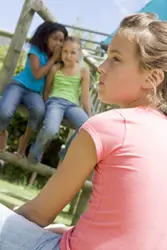
Studies show that between 15-25 percent of U.S. students are frequently bullied, according to StopBullying.com. Rick Niece, Ph.D., responds to this national problem with tips on how parents can help stop bullies, and with them the harmful results of their behavior.

The street stretching in front of the President’s Home serves as a bus stop for local school students. Pickup days gather a crowd of diversified youngsters. The other morning a police car was parked beside the bus. A benign interloper, I watched intently as two unsmiling officers spoke to attentive, fear-frozen little faces inside the bus. Curious, I waited before walking to my campus office to ask the policemen what had happened. They shook their heads in quiet frustration before one responded to my question.
“Several parents have reported incidents of bullying on this bus and at the elementary school,” he said. “We were asked to speak to the students, to give them a lecture. I guess that’s our job.”
In light of that episode and some other ugly incidents on the national scene, I offer five recommendations about adolescent bullying – a serious problem. As a lifelong educator, I find acts of intimidation – student against student – to be particularly troubling.
1. Speak Out
Bullying is not acceptable. As adults, we need to impress on children that bullying others and making fun of others will not be tolerated. It is wrong.
2. Teach Respect
Children crave role models – “big people” to emulate. Grown-ups do not merely set the standard, we are the standard, and our behavior is often modeled. We are the ones responsible for teaching children the importance of respecting others, emphasizing that respect is extended even to those we do not care for. And we teach respect by being models of respect ourselves. If we are not, good lessons go unlearned.
3. Remember Civility
We are surrounded by hate language. So are our children. Hate language is ubiquitous: at school, during athletic events, around the neighborhood, on talk radio and television, in daily conversations. The malevolent message is that if you disagree with me or if you look different than I do or if you pray in a church other than the one I pray in or if you express an opposing political viewpoint, then I have the unconditional right to talk you down, no matter how vile my words may be. All the while, we forget that children are listening.
Remember the meaning of civility, then practice being civil. If we are caught off-guard by someone’s oafish actions or when we begin to flare-up during our angriest moments, let’s respond civilly. I think civility is as contagious as contemptuousness.
4. Understand the Individual
Encourage children to make friends with a person who is different than they are. Knowing someone on a personal level increases awareness while decreasing misperception. When I was 9 years old, I met my soon-to-be best friend: a boy with very severe cerebral palsy who was on my paper route. Initially, I was afraid to meet Bernie – who knows why young boys fear what they fear – and our first meeting was a disaster. That evening my father offered advice that has stayed with me a lifetime: focus on making people comfortable with you, rather than fixating on your discomfort with them.
5. Make a Difference
Can we stop all bullying? I am not that naïve nor can I think that big. I can, however, make a different on the micro-level that is my own backyard. When I was a high school English teacher, I did not always agree with my principal or the inflexible district-wide policies. I certainly was not a rebel, but when I closed my classroom door and was alone with the students, I was in charge of that domain. That is where I made a difference.
We each exert influence in our domains, our personal arenas – the classroom, the workplace, our family, a circle of friends, church, even a college campus. We can each make a difference in our own backyards, yards that reach out to connect with others. We can each build a bully pulpit, stand atop it, and speak out against the acts of bully pummel. Do we expect someone else to stand up and do it for us?
We are the voices of respect and the keepers of tolerance. We are the teachers and the role models. If confronting bullyism does not start with us, it will not end with children.
Rick D. Niece, Ph.D., author of The Side-Yard Superhero, currently serves as President for the University of the Ozarks in Clarksville, Arkansas. Along with his wife, Sherée, he works to provide intellectual and cultural enrichment for the 650 students at the University, preparing them for graduate school and professional employment success while establishing lifelong values. For more information, please visit www.RickNiece.com.


















